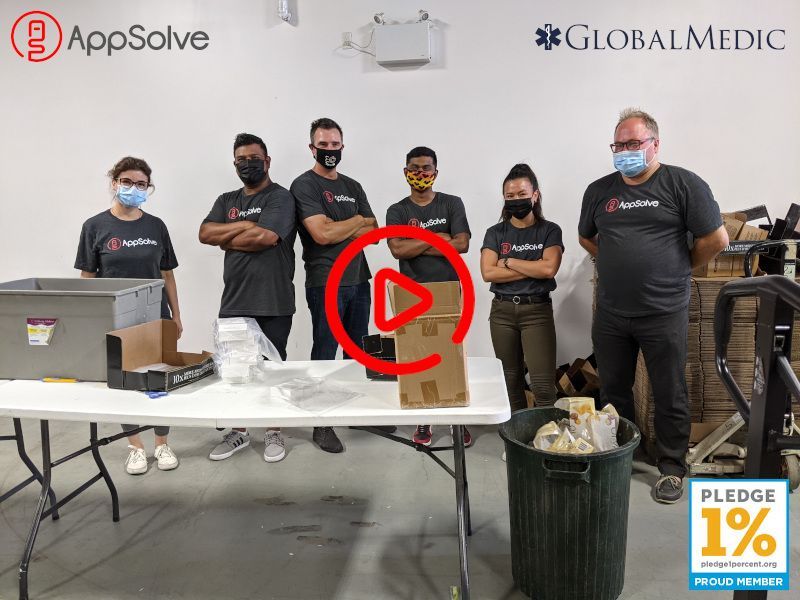Article originally posted by Melanie Marten, Forbes Councils Member on Forbes.com here.
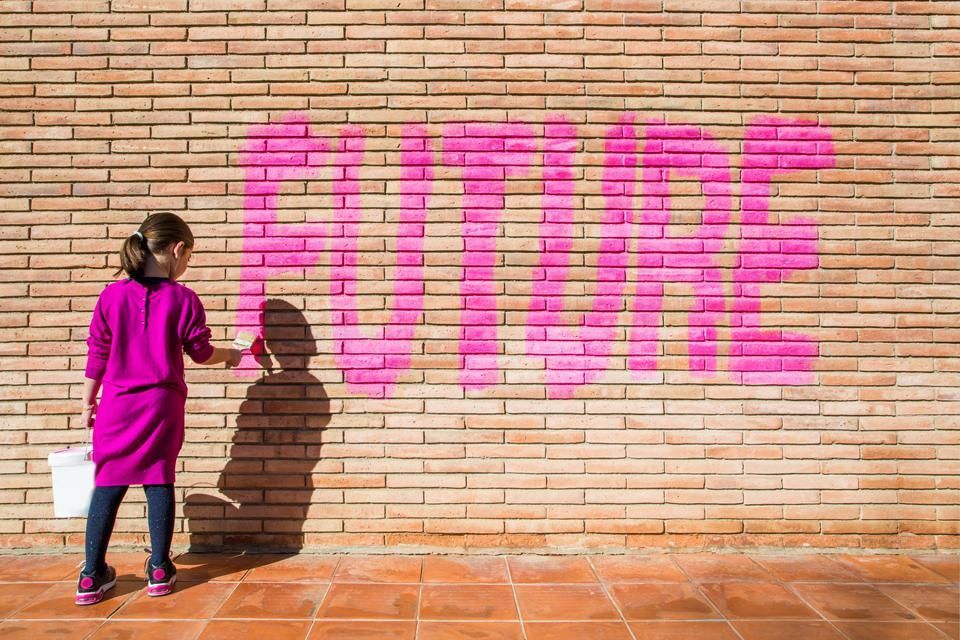
The role of public relations in 2022 is to foster the authenticity that so many crave in an economy that appears to operate at surface level.
“Purpose” is a term that has been widely used in the last year when communications professionals want to advise their clients that they need to stand for something bigger than profit. 2021 marked the first step in stressing the importance of the values of brands, companies and entrepreneurs. Brands understand that their audiences are looking behind the scenes and rightly demanding an inclusive and diverse team environment. It’s time to act.
Responsibility
To remain relevant in 2022, brands, companies and entrepreneurs must go beyond what is right and provide real service to humanity, society, communities and the environment. Public relations efforts will truly include all stakeholders, and the term “stakeholder” must lose its strong association with investors only.
PR strategists in 2022 engage with the artisans and communities the brand works with, telling their stories and how the brand impacts their lives, livelihoods and mental health. To make those stories stand out, brands will have to go above and beyond to live up to the responsibility they have.
In my work as a public and investor relations consultant, I see investors increasingly seeking out business owners who focus on community building and working toward a true change instead of putting their resources into creating presentable PDFs and campaigns designed for investors. Guess what? Reputable investors go above and beyond to support this drive. From my experience, investors make up a large part of the audience that seeks authenticity.
Values
Relevant public relations in 2022 is communicating values, and companies will need to do their homework in defining their values. We first saw an increase in value communication when the run on talent emerged. Employer branding became part of a company’s PR when simple paychecks wouldn’t get the best employees anymore. These nurturing assets must now be extended outside of talent acquisition, to the communities with which the company comes in contact, and to the environment.
The new value definition goes beyond the reference to a one-pager on a company’s website to a Corporate Social Responsibility setup. It needs to be tangible to be believable. To put it bluntly, it is not enough to point out that your company donates a portion of its profits each year, as this demonstrates not much more value other than a convenient tax benefit from donations.
What we can learn from The Great Resignation in 2021 is that employee satisfaction may not have been a true intrinsic value of many companies. With the number of people switching to freelancing careers exploding, a large number of them are only taking on projects that align with their values, a WeTransfer Ideas Report 2021 states. The report also indicates that Gen Z is experiencing mental health issues, feelings of isolation and financial troubles. They want brands to take the lead in fighting for a more sustainable future.
When we talk about values in 2022, business owners are advised to dig deep in their hearts to find a cause they truly care for so they can commit to it long term.
Action
In 2022, public relations will need to provide answers about what action is being taken on climate, racial issues and social justice. Entrepreneurs, wake up! The “me, me, me” perspective is over.
In my work as an agency owner, clients have still too often completely ignored the fact that they have a social responsibility, and that public interest is generated when they offer real added value to society at large. Many clients believe that their product or service alone provides the value to claim top-tier media coverage. The effectiveness of billboard ads is highly decreasing and, instead, business owners are demanding media publicity as their “new age” billboard ad. This approach does not lead to the desired (fast) results on the clients’ side.
Public relations will be the key business development tool in 2022 for those who understand its core value. Communications (PR for short) as a discipline must aim to create an environment of transparency and build open and honest relationships. PR strategies provide an opportunity to reflect on and improve one’s actions and grow positive impact.
No matter how big or small, old or young your business is, there needs to be a commitment to integrate giving back into the DNA of your business. Pledge 1% is a good example; a movement that tech companies join to support each other in the mindset of giving that aligns with their values and larger business goals.
Once entrepreneurs devote their willpower to doing good, public relations will leverage that drive to reach maximum success.
Follow Melanie Marten on Twitter or LinkedIn. Check out her website.
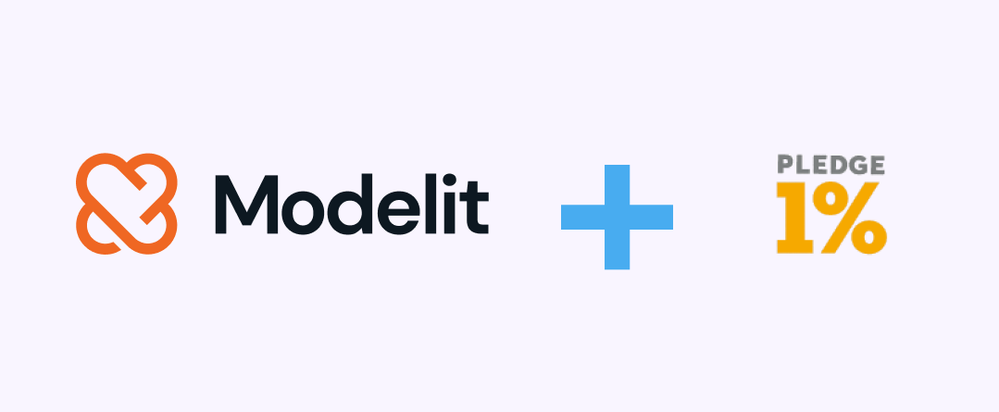
We have joined Pledge 1%, a global movement to create a new normal for companies of all sizes and stages to have a positive social impact through their business. We are proud to announce our commitment to donate 1% of our staff time to several initiatives in Uruguay.
One of our pillars is to help people grow and thrive with Salesforce and technology. Our staff will lead initiatives to help reduce the gender gap in IT and promote inclusive opportunities to rewrite your career in the industry.
Add to that, at Modelit we are committed to helping the community. We will team up with non-profit organizations and volunteer groups to support and strengthen low-income families in the Montevideo area.
Our co-founder, Diego Febles, said that it’s a great way to give back to the community.
“We’re very excited about being part of Pledge 1%. We think that with these initiatives we can give back and create a positive effect on our communities”.
Modelit is proud to join the Pledge 1% community and encourages other companies to take the pledge and leverage their business as a force for good.
To learn more about Modelit’s program, contact communications@modelit.xyz
ABOUT PLEDGE 1%
Pledge 1% is a global movement that inspires, educates, and empowers every entrepreneur, company, and employee to be a force for good. Over 12,000 members in 100+ countries have used Pledge 1%’s flexible framework to ignite half a billion dollars in new philanthropy. To learn more about Pledge 1% and to take the pledge visit www.pledge1percent.org.
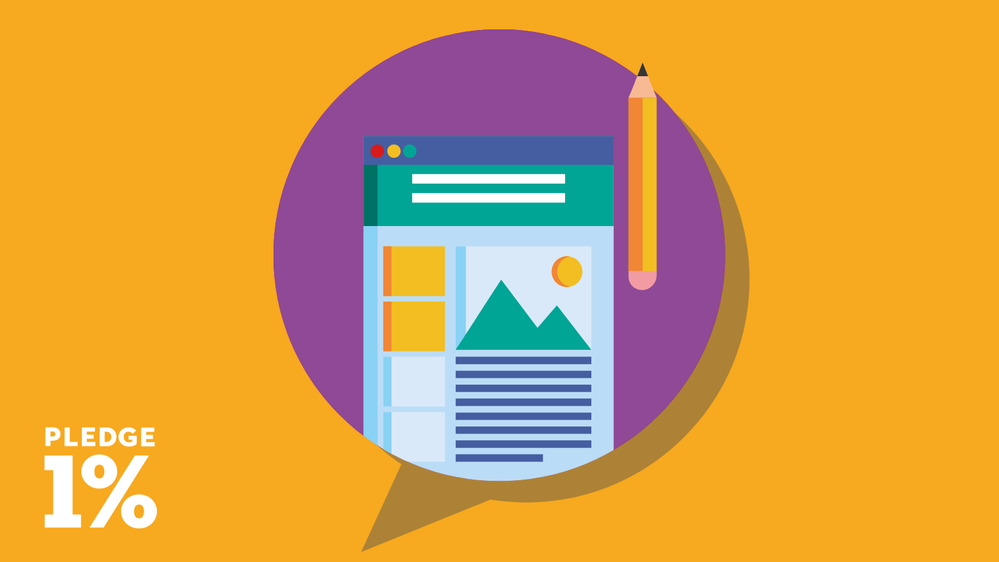
As part of our summer learning series on ESG, our fourth session addressed how pre-IPO and post-IPO companies pick ESG frameworks and report, disclose, and communicate them. Read the recap below and access the workshop resources here.
In Part 3 of our summer learning series on ESG, we learned about conducting materiality needed for ESG initiatives. We understood that in order to solidify our ESG roadmap, we need to bring in stakeholders, build a team with various responsibilities, and stick to our vision and values when conducting analysis.
In this third session, Kari Hayden Pendoley moderated our conversation with Danielle Conkling of Silicon Valley Bank, Marian Macindoe of Uber, Sunya Norman of Salesforce, and Lindsay Vignoles of Rodan+Fields as they talked about what material issues their companies report and disclose on. Here are our 3 takeaways from the event:
1. Your ESG strategy must be grounded in a materiality assessment.
Philanthropy has been around for a long time with people improving natural and human capital, however ESG as a function is fairly new. There are numerous world crises. Focus on the material issue that impacts your stakeholders the most, develop and execute a strategy around it, and then manage and report with concrete data.

2. Data collection and reporting is an evolving cross-functional process.
Reporting and managing ESG statistics is a long process that involves a number of teams and different stakeholders. It’s a journey that might feel difficult to go through, especially if you’re a one-person team or leading a new initiative in the company. Sharing your ESG commitments with your stakeholders will be more effective using credibly obtained data.

3. Recognize that ESG reporting brings more opportunities for social impact.
With your knowledge of world issues, what your specific industry is tackling, and by understanding the demands of your stakeholders, your ESG program should reflect your company’s unique element or superpower and disclose what is material to you. ESG and social impact encourages collaboration rather than competition, and by working together with other businesses, governments and regulators can help maximize your impact.

To learn more, watch the full recording of the conversation below.
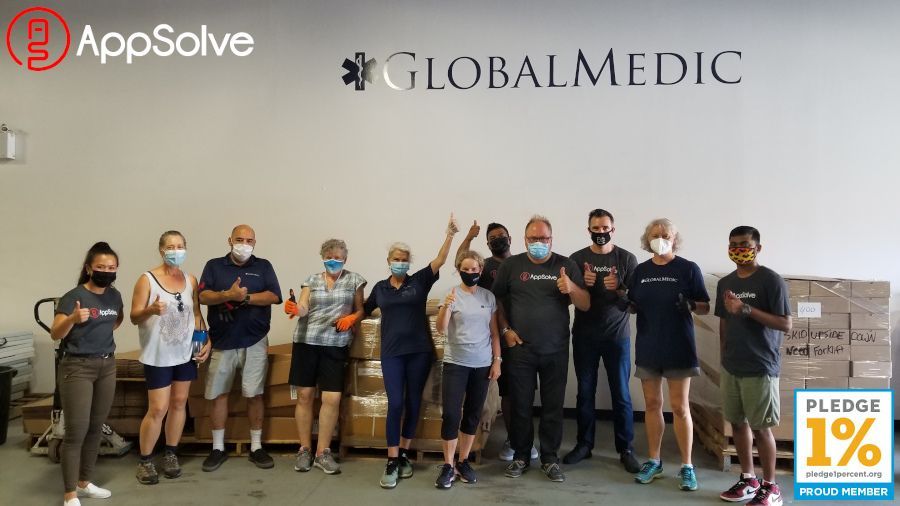
Originally published on App Solve.
On our second experience for Pledge 1%—a global movement that encourages companies to donate 1% of their time, profit, product, or equity—we decided to work with GlobalMedic, a registered Canadian charity that has provided disaster relief and life-saving humanitarian aid since 2002.
Who Is GlobalMedic And What They Do
The David McAntony Gibson Foundation, which operates as GlobalMedic, saves lives by providing short-term, rapid response in the wake of disasters and crises, both at home and abroad. Professional emergency workers along with other professional and skilled volunteers help deliver their programs to the people who need them most.
While GlobalMedic has run many non-emergency and capacity-building programs, the majority of their work continues to be critical intervention in the wake of disaster and crisis. GlobalMedic operates 6 primary Emergency Programs:
- Water: Deployment and operation of ‘point of source’ or ‘community’ water purification systems to ensure groups have access to large volumes of clean drinking water. GlobalMedic also runs hygiene programs to support the health of those facing emergencies.
- Food: Production and delivery of Emergency Food Kits designed to provide families with an easy-to-make, ready-to-cook meal option.
- RescUAV: GlobalMedic’s RescUAV Program uses sophisticated technology to collect important information fast following a disaster. Their specialty team deploys Unmanned Aerial Vehicles into disaster situations to collect this information. The UAVs are used to provide situational awareness, emergency mapping, and search and rescue.
- Flood: GlobalMedic works to aid those affected by flooding in Canada using a multi-pronged approach to support both flood mitigation and recovery.
- Medical: Donation and setup of field hospitals to restore access to medical care in a disaster or crisis-affected region.
- Shelter: Provision of tents and inflatable units that are used for temporary family housing, schools, child-friendly spaces, and even animal rescues.
App Solve In Action
Apart from providing clean water, GlobalMedic runs hygiene programs to support the health of those facing emergencies.
In this opportunity, we helped GlobalMedic in the assembling and final packing of family hygiene kits containing full-sized items including soaps, toothpaste, and toothbrushes to be given to vulnerable communities.
“This volunteer experience allows us to bond with each other around a cause which is aligned with the company’s values and vision,” says David Brabrook, CEO & Founder of App Solve.
“I am really happy we chose GlobalMedic to work with this quarter. It feels great to contribute to our community and help those who are in need,” says Natalia Monsalve, Digital Presence Coordinator at App Solve.
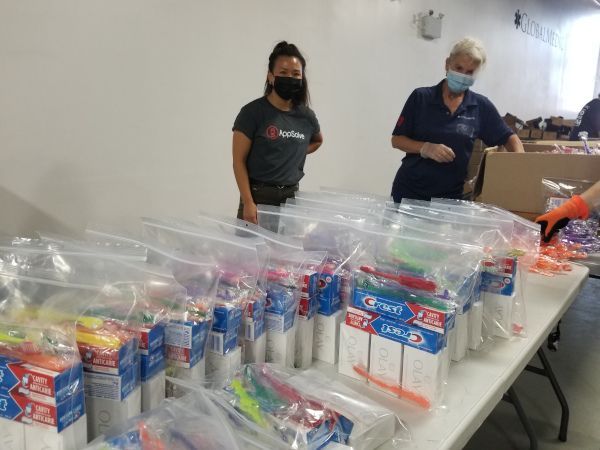
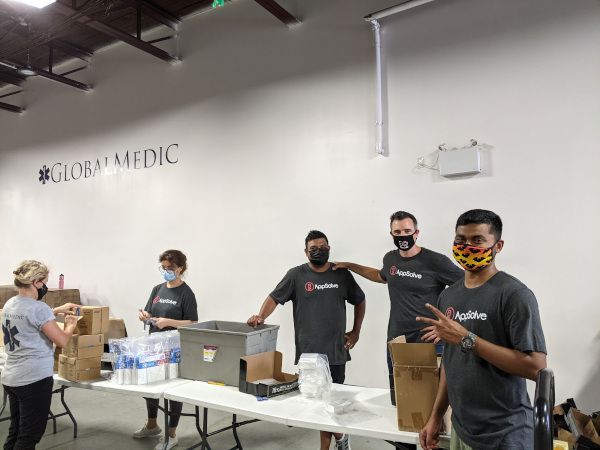
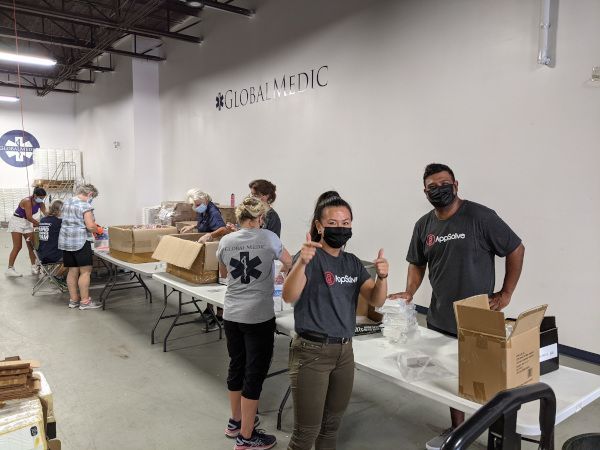
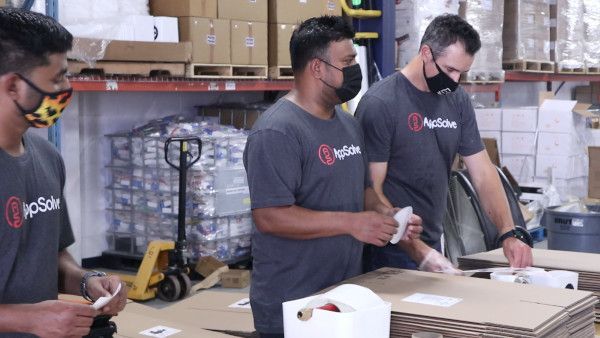
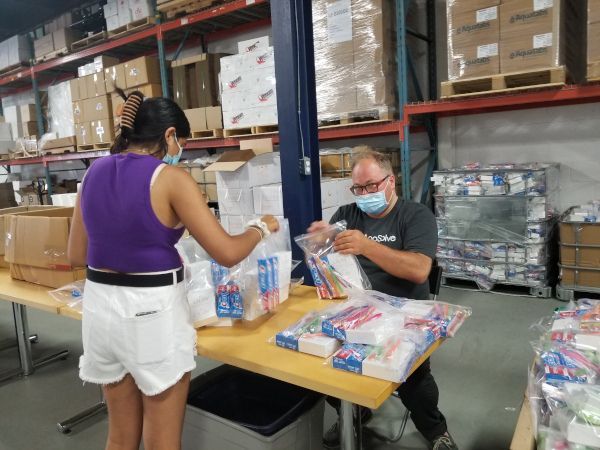
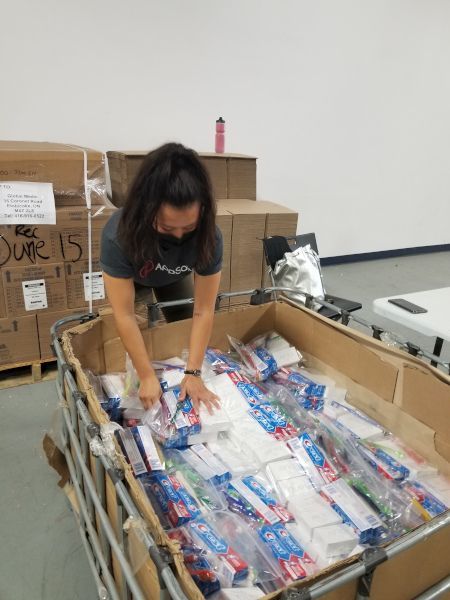
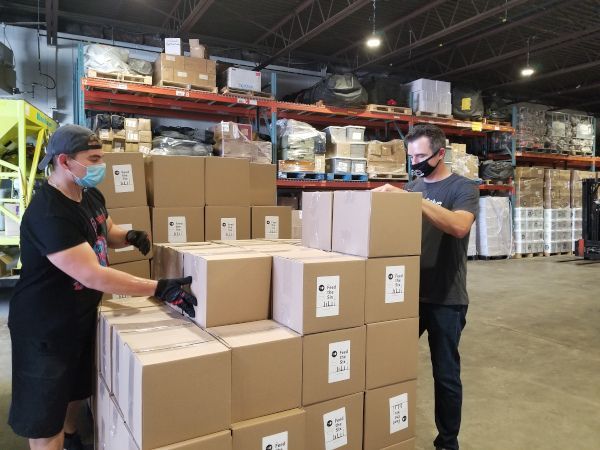
We want to thank Laura Garrioch, Emergency Programs Officer from GlobalMedic, and the rest of her team, for this opportunity to help our community. Thank you for letting us contribute to your amazing work!
GlobalMedic relies on donations and volunteers in order to carry out its mandate. Visit globalmedic.ca to join their team by volunteering, or making a donation. You can help make a difference in the lives of people affected by disaster and conflict.
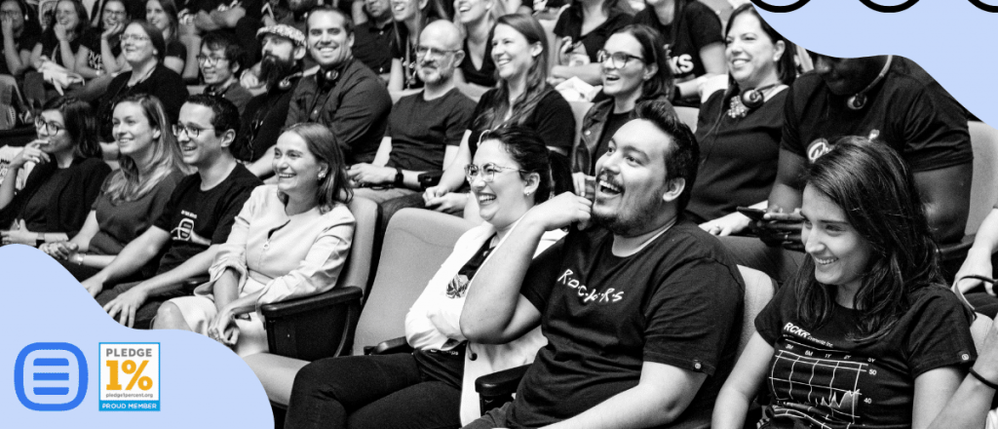
Originally published at Rockcontent.com. Written by Luana Dias.
In another major step towards accelerating social transformation, we have committed to donating 1% of Rock Content’s shares for social impact purposes.
Through the global organization Pledge 1%, the company is formalizing the reserve of 1% of shares to support and finance projects aimed at social impact.
The first step was the approval of this initiative by the Rock Content Board.
Our decision was inspired by global companies we admire, such as Twilio, Crunchbase and Atlassian.
In practice, what does this mean for society and the corporate market?
A Brief Retrospective
Since 2019, Rock Content has been committed to making a positive impact in its community.
With this goal, Rock.org, our social impact initiative, was created.
Despite being a new industry, the company’s commitment to social impact has advanced significantly over the years.
According to our Rock Content CEO, Diego Gomes, the commitment to giving back to our community has always been in the company’s DNA.
“We’ve always cared about creating growth opportunities. It’s in our mission. We started with Digital Marketing education and creating opportunities for our talents to make money while doing what they love. It has always been a driving force, and today we have amazing stories of people who joined us in this dream and had their lives transformed: people who found their first job or even managed to support their family and pay for their studies. We want to continue on this trajectory, ensuring that our commitment to impact will be a key part of our legacy!”
In terms of commitment to social impact, our first initiative was to encourage employees to be a force for good by donating 1% of their work time to give back to the community.
This means that Rockers — as we call our employees — have the option of donating 1% of their time (3 days per year) within the company to internal or external volunteer actions.
In addition, since the creation of Rock.org in 2019, we have held an annual Volunteer Day to support institutions aligned with our education and employability causes.
Currently, our engagement rate for those activities covers 66% of our team.
In 2020, we founded our social impact mission: sharing knowledge to accelerate social transformation.
To this end, we began donating Rock University courses to socially and economically underrepresented groups — in this case, women, the black community, people with disabilities, and the LGBTQIA+ community.
Through this commitment, we were able to impact over 50,000 students from 2020 through June 2021.
This way, we enable countless individuals to become great trained professionals and bring more diversity and inclusion to the job market.
Now, we are going further! Through the Pledge 1% initiative, Rock Content has committed to donating 1% of its social capital.
Equity Pledge Commitment
What is the Equity Pledge?
The Equity Pledge commitment means setting aside 1% of Rock Content’s equity (i.e., the company’s shares) to invest in social impact.
This action demonstrates our long-term commitment to giving back to the community and sustainably funding social work for years to come.
Check out other global companies committed to the Pledge 1% initiative:
Why do we commit?
We are increasingly looking to align growth and purpose, and the 1% Pledge commitment represents the path Rock Content wants to take to make a positive impact on the world.
For Patrícia Moraes, our board member, investor and founder of Unbox Capital, the decision of Rock Content’s Board to support the Equity Pledge was a natural development for the company.
In this sense, the decision was made to complement the culture of giving back that already exists among Rockers.
“The Equity Pledge is very straightforward in that sense. As you generate value in your business, you also distribute it to others. It’s part of the company’s culture. This passion has always been one of the pillars that stood out at Rock Content.”
The Equity Pledge is another way of reaffirming our values.
With this, we are leading by example, encouraging other companies to get to know initiatives like Pledge 1% and truly commit to social impact.
How did we make this commitment?
The Pledge 1% organization supported Rock Content throughout the shares donation commitment process, providing materials, references and advice.
For those who don’t know, Pledge 1% is a global movement to create a new reality, where giving back becomes part of the structure of companies of all sizes and stages.
Its role is to inspire, educate and empower all businesses to be a force for good.
Rock Content’s commitment is:
To pledge 1% of TIME
We offer our employees the possibility of donating 1% of their work time to volunteer activities internally or externally.
To pledge 1% of PRODUCT
We donate one of our products — in this case, paid courses from Rock University, our education platform, to under-represented and economically vulnerable groups.
To pledge 1% of EQUITY
In our most recent commitment, we donate 1% of Rock Content’s shares.
The Impact of the Equity Pledge
According to Diego, it is clear that customers, employees and the surrounding community care about being connected to a company that wants to leave its mark on the world.
“For us, the Equity Pledge means that we are committed to donating part of the value created by Rock Content to causes we believe in. We believe this is very important to ensure that our legacy of impact is preserved. Success for us is building an impactful company that will outlast us!”
The Equity Pledge commitment is related to all of our stakeholders — and that’s very important to us. After all, the way in which investments are made increasingly reflects the impact that we seek in this world.
Therefore, we want to present how the Equity Pledge positively impacts our stakeholders:
The community
Once the donation has liquidity, such as in the case of an IPO or a secondary share sale, we will donate strategically to non-profit organizations and projects around the world that share our mission, focusing on education and employability.
This way, we will have more resources to scale our impact, donating consistently to those who need quality education and better job opportunities.
The Rockers
Diego Gomes points to Rockers as the main drivers of social impact within Rock Content.
“Our biggest drivers are the Rockers, from the board to the frontline. They not only care about impact as much as I do personally, but they work with a focus on making a meaningful impact on the communities around us. They are the ones who make it happen.”
Regarding his role in this, Diego puts himself as a facilitator.
“I care a lot about creating a positive impact on the world, and that is a significant part of what we want for our legacy. My role as the CEO of Rock Content is to be an impact facilitator!”
Diego says that whenever he talks to the employees about Rock Content’s social impact, they usually point out that it is one of the main reasons they chose to work at the company.
“Rockers come to work more motivated, excited, and feel proud of their work, of what we are building here. Today, wearing a Rock Content shirt means ‘we care about making a difference, we care about our legacy’. And because of that, we continue to deliver great business results. To me, that’s the best of both worlds. Impact means having a business with a purpose, and this commitment ensures that those things go hand in hand.”
To our investors and market
The decision means that our current investors’ mission and long-term goals are aligned with ours.
The commitment has received a positive response from the board, which means that investors are fully involved in the initiative.
Future investors will also share this belief with us. This demonstrates how social impact is in our DNA at all levels and is a priority for us.
For Ricardo Coelho Duarte, our board member and investor:
“Rock Content is the living proof of how doing business and social responsibility are more than ever one integrated, strategic action. Maturing the Pledge 1% to its full commitment is 100% aligned with the leadership and more importantly, with the company’s current and future talents. We expect the best people to be engaged, achieving greatness at Rock, and as a result, change the world for the better.”
Bostjan Spetic, also a member of our board, uses the metaphor of an ecosystem to explain the Equity Pledge commitment and what it means for society as a whole.
“No individual, no team and no entrepreneurial endeavor exists in social isolation. We are extremely aware that it is the society as a whole, the community we take inspiration from and the environment that supports our explorations that take our actions to the next level and help us stay on course. It is our duty and also our passion to ensure the ecosystem that sustains our growth is able to flourish alongside us. We take this reciprocity as a ground condition of a symbiosis without which the world would be utterly unrecognizable to us. We are honored and humbled by the opportunity to support Pledge 1% movement and commit 1% of our equity for social impact to keep improving the state of the world.”
The Future of Social Impact
While it is difficult to imagine the ideal scenario for the best version of the world, steps like the ones Rock Content has taken indicate that a significant social transformation is underway.
In Diego’s opinion, the commitment to equity donation is an important step in ensuring that our impact initiatives grow in the future.
“The impact we create now is tied to the growth of the business. The equity commitment for us means that in a liquidity event, in a future round or (most likely) in an IPO, we will have a significant amount of resources to continue funding these important initiatives.”
Moreover, the impact commitment for the coming years strengthens Rock Content’s globalization strategy and culture.
For Diego, commitments like this bring the company closer to people who think about impact the same way we do.
Thus, we have a very positive formula as an organization before the market and society:
More talents + More cultural alignment = More impact
For board member Patrícia Moraes, there is undoubtedly a normalization of social impact and ESG taking place in the corporate market.
And, in the future, this will be even more noticeable.
This is why we need “companies with a soul” — an expression she uses to define companies that have purpose and a strong culture.
According to the board member, one possible path for companies to follow is to look inside first, find the important gaps that can change the company’s level, and then implement actions that can transform the culture and the company.
“Rock Content has always been very consistent in this, since the beginning of Rock.org, because the company has been developing an awareness”.
With great expectations for the future, Gabriela Crego, Rock Content’s Social Impact Leader, states:
“Since its creation, the Rock.org team has been concerned with doing a coherent and consistent work in terms of impact and results. In 2021, we are ready to expand our social impact efforts: we have committed our equity. And going forward, we are working to see even more results and actions in this sense.”
Want to learn more about our social impact efforts? Check out our page!

Originally published at Salesforce.com.
As Salesforce and Slack come together to create the digital HQ, helping companies adapt to a new work-from-anywhere world, they are also committed to creating a more just and equitable society.
When Salesforce completed its acquisition, Slack donated $54M, the balance of the value of its Pledge 1% share reserve, to the Salesforce Foundation, solidifying the change both companies can make together. The Salesforce Foundation helps young people reach their full potential by supporting Education and Workforce Development programs. To date, Salesforce has given more than $475M to support communities in need around the world.
Both Salesforce and Slack are deeply committed to Pledge 1%, a global movement co-founded by Salesforce, to inspire, educate, and empower all businesses to leverage their assets and make social impact an integral part of their company. A pledge can include any combination of product, equity, profit, or time to any charity of their choice.
Since 2014, more than 12,000 companies in over 100 countries have joined the Pledge 1% movement. These companies have generated more than $1 billion in new philanthropy and continue to go above and beyond initial commitments as crises arise.
For instance, in May, a global coalition of Pledge 1% companies responded to the ongoing COVID-19 crisis in India by unlocking over $28M worth of donations to provide medical supplies, food relief, and vaccine awareness and distribution.
Slack for Good, which includes Slack’s commitment to increase the number of historically underrepresented individuals in the technology industry, will continue to be a part of Slack, and its strategic grant-making will be integrated into the Salesforce Foundation.
Committing to a culture of philanthropy
Giving back isn’t just about giving money. Salesforce takes a holistic approach by putting the full power of the company behind its philanthropic model. This includes amplifying impact through grants, employee engagement, partnerships, and technology.
In fact, Salesforce employees are the driving force behind how the company contributes to improving the world. Citizen philanthropy is Salesforce’s approach to giving back via employee engagement and is centered on the belief that individuals have the power to make a difference through their time, talent, and resources. Salesforce offers 56 hours of paid Volunteer Time Off (VTO) each year for employees, and this program has resulted in 6.2M volunteer hours over the years. And now, Slack employees will be able to participate in Salesforce’s VTO program as well to drive further impact in communities in which we live and work.
More than 52,000 nonprofits, educational institutions, and philanthropic organizations use Salesforce for social good, and Slack offers free or discounted software to nonprofits through its Slack for Nonprofits program. Together, Salesforce and Slack are committed to opening the doors of opportunity so that everyone has equal access to a quality education, a meaningful career, and the ability to reach their full potential.
Learn more about the Salesforce Foundation here.
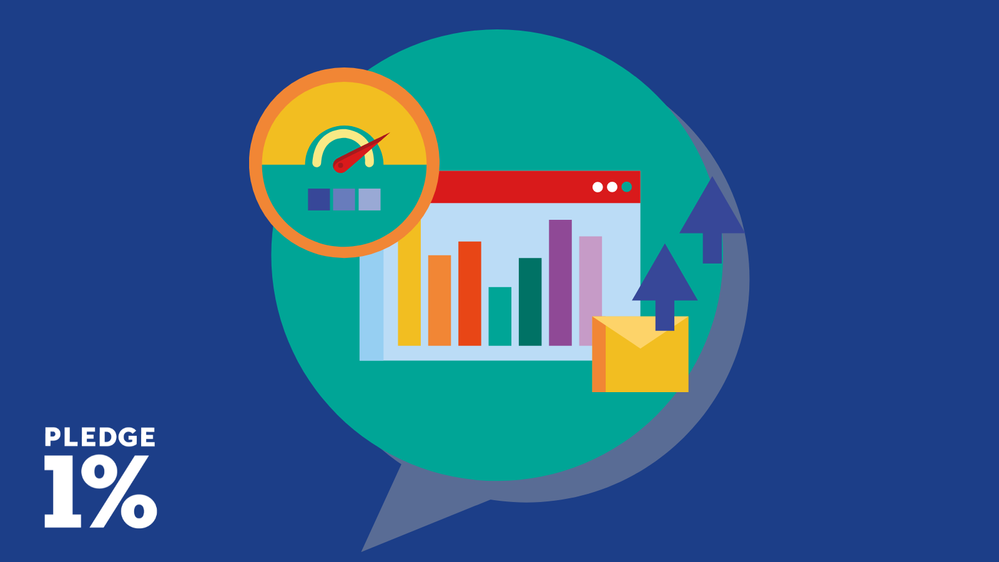
As part of our summer learning series on ESG, our third session briefly tackled how our panelists got started on their ESG journeys and how they approached their materiality assessments in their respective companies. Read the recap below and access the workshop resources here.
In Part 2 of our summer learning series on ESG, we learned that materiality assessments are a crucial part of your ESG journey. Whether you’re using internal information collected through customer surveys and employee meetings or hiring a consultant for external accountability, crafting an ESG roadmap is affected by multiple factors that impact the short- and long-term value of your company.
In this third session, Kari Hayden Pendoley moderated our conversation with Corrie Conrad of Box, Alessandra Clará of Unity Technologies, and Andi C. Trindle Mersch of Philz Coffee as they talked about their companies’ approach to conducting materiality needed for their ESG initiatives. Here are our 3 takeaways from the event:
- Materiality is constant iterative learning. Upon considering the relevant ESG issues to your company and industry, it’s important to keep an open mind as you explore your options. This means you may just keep doing what you’re doing, rather than starting over. The important part is to focus on your company’s priorities and current environment; you don’t need to change just because everybody else is doing the same.

- Empower your stakeholders through tasks and responsibilities. Know your audience— whether their mindset is driven by cost savings, reputational risk, or customer loyalty—and modify your materiality pitch in a way that resonates with particular stakeholders in your company. Once they’re sold to the idea, form a working group committee that is responsible for something, even if it’s a page on the annual report or a statement on the website.

- Peer benchmarking helps to identify where you are and where you want to be. One of the things you can’t capture through qualitative interviews with internal folks is the future of the new C-suites or future customers you want to have. While doing materiality, it’s important to pause and look back to see that your core values, mission, and vision are still reflected in the analysis.

To learn more about the specific tactics used by our panelists in making ESG a priority in their company, watch the full recording of the conversation below. Don’t forget to join us for the LAST session on August 26th, 1:30PM PT/ 4:30PM ET!
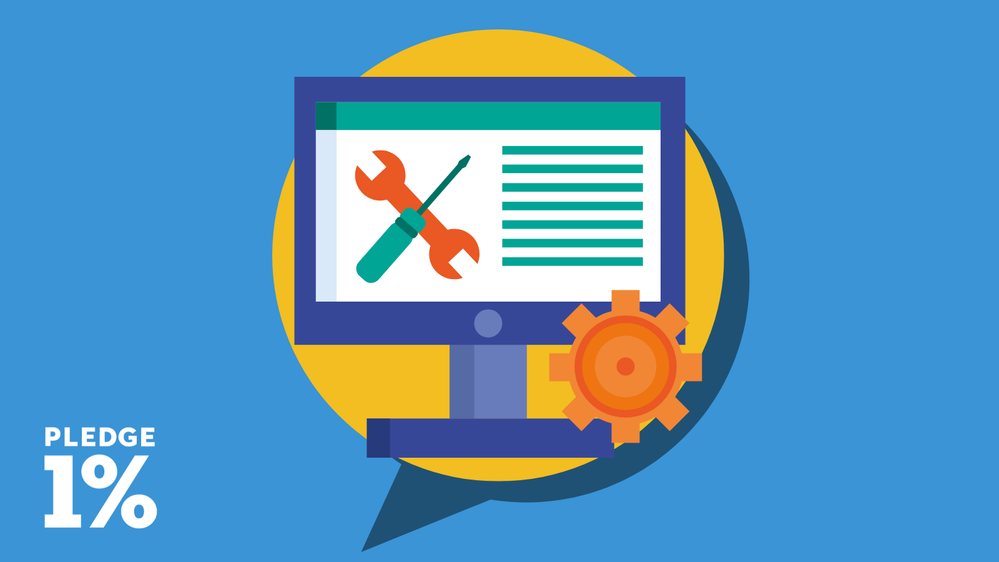
As part of our summer learning series on ESG, our second session went into further detail on how to get started, with speakers providing specific steps they took within their companies to guide us in our ESG journey. Read the recap below and access the workshop resources here.
Integrating sustainability into your business has never been more important. The pandemic, racial injustice, and catastrophic natural disasters that we experienced in the last year not only forced many businesses to step up and help; it created a new sense of urgency for companies to adopt new missions centered around ESG. This is allowing us to look at long-term company performance and align them with corporate sustainability goals.
Part 1 of our summer learning series discussed the tangible benefit that ESG brings to companies and how it can help create goals that reflect your company’s values and stakeholders’ interests. We were delighted to have Olivia Khalili of PagerDuty speak with Erin Baudo Felter of Okta, Danielle Conkling of Silicon Valley Bank, and Josh Whitney of Anthesis Ventures to share their insights on their ESG journeys and how they see their programs evolving as the business environment adapts. Here are our 4 takeaways from the event:
- Don’t do ESG by yourself.
Social impact isn’t enough in the complex world of ESG. Understanding the people who care about your ESG disclosures is the first step, and for many companies, they will be your customers, employees, and investors. Discuss the specific issues they want to see addressed and talk to relevant departments within your company who will form your working group or committee.

- Use data to tell a story and get buy-in.
Whether you’re using internal information collected through customer surveys and employee meetings or hiring a consultant for external accountability, materiality assessments are a crucial part of your ESG journey. The data doesn’t have to be scientific to tell a story, but it needs to be anecdotal or quantifiable.

- ESG is evolving.
The most important part of early-stage ESG work is getting people on board. Setting up an accountability structure can start with one team, but understanding ESG is a task that will touch all areas of your organization. Catching up on trends, new learnings, and being open to change can make the difference and help you get things done.

- Be tactical in your communications.
Forming allies in the executive team is helpful once you start communicating your long- and short-term ESG goals. A zero-budget tactic is to build momentum by writing up what you’re doing, whether it’s a page on your website or a thought leadership piece.

To know more about the ESG roadmaps used by Okta and Silicon Valley Bank, watch the full recording of the conversation below. Don’t forget to join us for the next session on August 12th, 1:30PM PT/ 4:30PM ET of our ESG Summer Learning Series!
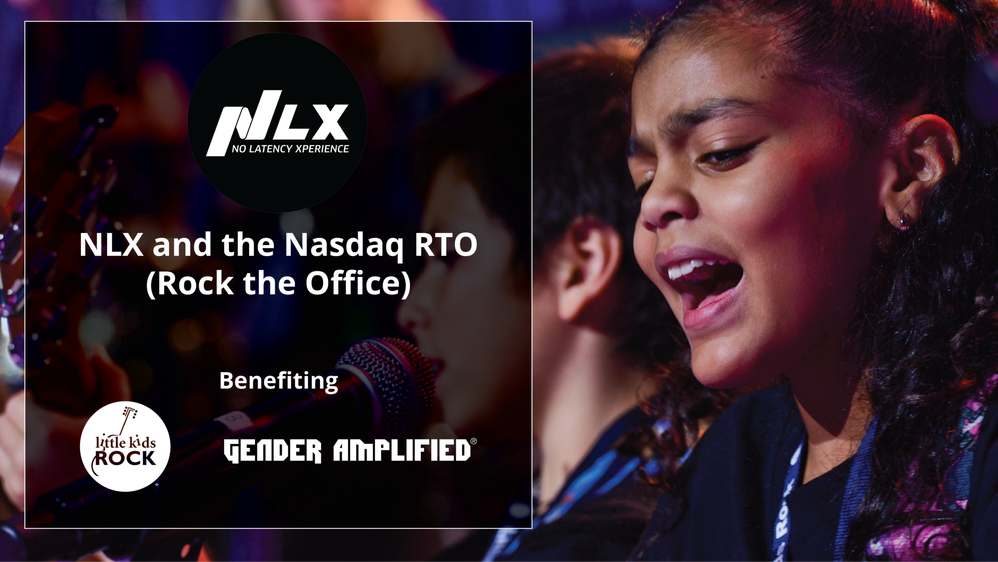
We’re excited to be sponsors for the upcoming Nasdaq and NLX “Rock the Office” Benefit! Live streaming and recorded video segments will bring us back together as we help Little Kids Rock and Gender Amplified bring music and music production back to young students and women.
Join the fun on Tuesday, August 3, 2021 to celebrate! The event teaser will take place at 10AM ET for 30 minutes followed by the main event at 6PM ET. If you have any questions, please contact Mike.Viola@Nasdaq.com or click here to view the sponsorship deck.
Proceeds from this event will be donated to support two nonprofit organizations: Little Kids Rock, a national nonprofit 501(c)(3) organization that transforms lives by restoring, expanding, and innovating music education in our schools, and Gender Amplified, a non-profit organization that aims to celebrate women and non-binary individuals in music production, raise their visibility and develop a pipeline for girls and young women to get involved behind the scenes as music producers
About Lookout Foundation
The Lookout Foundation invests in communities outside our own doors where we can see the results. Its mission is to support Science, Technology, Engineering and Math (STEM) education for women, girls, and other underserved groups, and security and privacy rights for all.
The Lookout Foundation is a public charity and a non-profit 501(c)(3) organization. It is entirely run by Lookout employees on a voluntary basis. Employee-led committees decide where and how Foundation money is distributed, and organize activities to donate time to local organizations.
